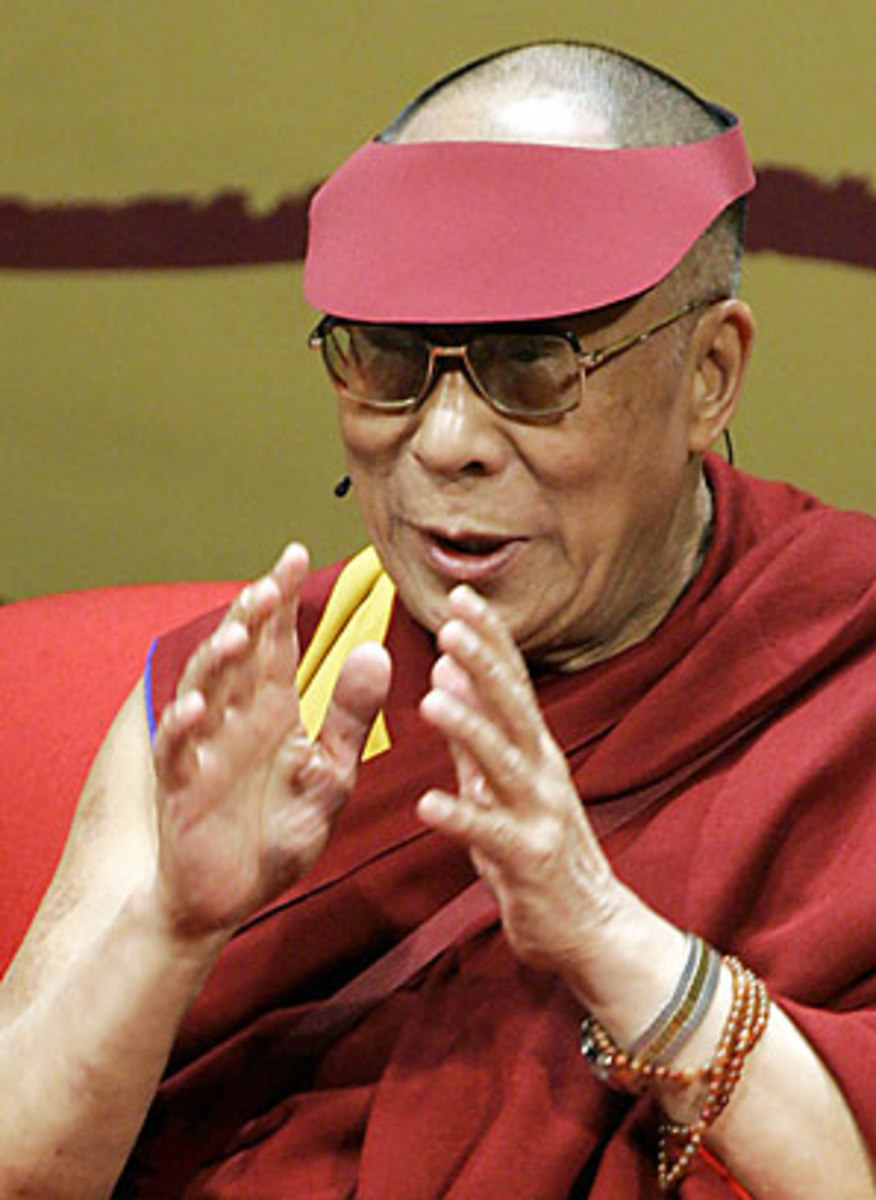Still reason to worry about the Olympics -- five reasons, actually


I wish I had taken notes, but I was too busy eating a club sandwich. What I do remember of my early 1990s lunch with the Dalai Lama -- a session with about a dozen other magazine editors at a dining room in the Time & Life Building in Manhattan -- was that, beneath his ancient red monk's robe, His Holiness was wearing hiking shoes. Birkenstocks, perhaps. Maybe Timberlands.
I now recall that the lunch was an off-the-record session, so perhaps I have revealed too much already -- though if you search the web you'll find entire columns devoted to the Dalai Lama's footwear. Nothing the exiled Tibetan spiritual leader said that day, at least to my memory, suggested that he would someday send the Olympics into upheaval. His serenity, rollicking good humor and heartfelt message of peace underscored a desire to solve problems without violent confrontation. His curiosity about the world (especially science) bespoke a man more interested in discovering answers than imposing them.
He might have made a surprisingly good president for the International Olympic Committee.
Instead he has become a political fulcrum on which the Beijing Olympics dangerously teeter-totter. I say "dangerously" even though the Summer Games have for years lived from crisis to crisis. We have seen three boycotted Olympics, one athletes' village terrorist attack, two riot-torn host countries, a string of blockbuster doping scandals and at least two cities saddled with crushing debts -- all just since 1968.
But these Games have become a unique sort of mess. So many problems have hit simultaneously: rioting in Tibet by the Dalai Lama's followers, torch-relay protests, pollution fears, international condemnation of China's role in Darfur, threatened boycotts of everything from opening ceremonies to products made by Olympic sponsors, even an alleged plot by provincial Islamic extremists to disrupt the Games with bombings and kidnappings. China's long-anticipated global coming-out party is devolving into potentially the most divisive and damaging sporting event in decades. And I'm one who believes in the redeeming value of the Olympics.
Here are five reasons to worry about what lays ahead for the Beijing Games:
The Chinese government still doesn't get it.
The one thing the world didn't want China to do was to try to host dissent-free, showcase Olympics. But China is still attempting to do just that. Its government has been blindsided by the global protests -- and genuinely perplexed by them, suggesting a surprising lack of understanding of today's world. Its grudging offer to meet with representatives of the Dalai Lama to discuss the situation in Tibet will win it little international goodwill.
The anti-Western backlash among the Chinese citizenry is real.
Just as many Americans react defensively to criticism of U.S. from abroad (side order of crow with those Freedom Fries?), many Chinese bristle at what they perceive as constant China-bashing from the U.S. and Europe. This week a New York Times story quoted a poem posted on the Internet by "A Silent, Silent Chinese" and said by Chinese college students interviewed by the paper to accurately reflect their own feelings:
When we were poor, you said we were destroying the planet.When we tried limiting our numbers, you said it is human rights abuse.When we were poor, you thought we were dogs.When we loan you cash, you blame us for your debts.When we build our industries, you called us polluters.When we sell you goods, you blame us for global warming.
Could athletes from the U.S. or, say, France -- which has already been targeted by protesters in China for alleged anti-Beijing, pro-Dalai Lama bias -- receive a less-than-rousing welcome from Chinese fans? Especially if one of the athletes criticizes the policies of the host country? Or does something unsportsmanlike against a Chinese opponent? There is a risk that the Beijing Olympic slogan could change -- and it may already be changing -- from "One World, One Dream" to "Us Versus Them."
The Anti-Olympic movement has been born.
Thanks to this year's torch relay, grassroots protest groups have discovered that the Games are a stage that commands the world's attention like nothing else. As if fears of disruptions and terrorism didn't already weigh heavily enough on host cities, now every future torch run could be a magnet for rebels with a cause. It is not farfetched to imagine that at least one anti-Olympic protester, and perhaps a number of them, will find their way to Beijing this August.
Olympic sponsors don't need any more p.r. disasters.
There could be a silver lining to all the unwanted attention the Beijing Games are receiving: Olympic TV ratings this August might go up. But advertisers and Games sponsors do not like controversy and negative news. Everything that is happening is making future Olympics a harder sell for the IOC.
The Games haven't even started yet.
Some national Olympic Committees are warning athletes not to discuss politics in Beijing, and even though the Olympic Charter bans any kind of "demonstration or political, religious or racial propaganda ... in any Olympic sites, venues or other areas," the reality is that 20,000 reporters, photographers and broadcasters will be thrown in with 10,000 athletes for more than two weeks. Journalists are going to ask pointed political questions day after day. It seems almost inevitable that someone taking part in the Games will say, or wear, something inflammatory. How the IOC and the Chinese handle that moment will be crucial to the success or failure of the Olympics.
It is mere coincidence that the Dalai Lama maintains a government-in-exile office in London, the site of the 2012 Summer Games. Four years from now, as Britain throbs with its own Olympic headaches, perhaps he would be available for another lunch. We could talk about the eternal challenge of bringing the world together.
